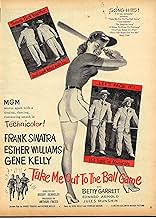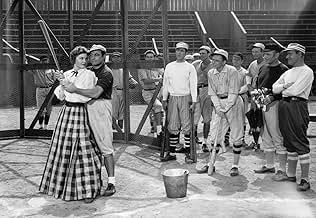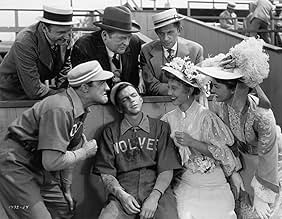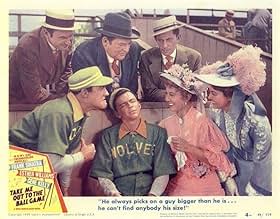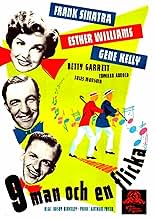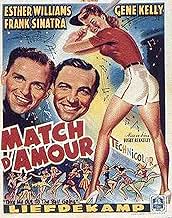IMDb RATING
6.6/10
4.3K
YOUR RATING
Two turn-of-the-century baseball players, who work in vaudeville during the off-season, run into trouble with their team's new female owner and a gambler who doesn't want them to win the pen... Read allTwo turn-of-the-century baseball players, who work in vaudeville during the off-season, run into trouble with their team's new female owner and a gambler who doesn't want them to win the pennant.Two turn-of-the-century baseball players, who work in vaudeville during the off-season, run into trouble with their team's new female owner and a gambler who doesn't want them to win the pennant.
- Awards
- 3 nominations total
Dorothy Abbott
- Dancer
- (uncredited)
Harry Allen
- Wolves Player
- (uncredited)
Murray Alper
- Zalinka
- (uncredited)
Bette Arlen
- Girl in Bathing Suit
- (uncredited)
Gilbert Barnett
- Kid
- (uncredited)
Virginia Bates
- Girl on Train
- (uncredited)
Richard Beavers
- Wolves Player
- (uncredited)
Ramon Blackburn
- Wolves Player
- (uncredited)
Royce Blackburn
- Wolves Player
- (uncredited)
Ellsworth Blake
- Wolves Player
- (uncredited)
Featured reviews
There are a couple of reasons why this movie is in my opinion better than the average MGM musical movie.
One is the story. Of course it features a love-story but the movie takes an original approach and takes a couple of nice turns with the love-story. Who is falling in love with who always remains a surprise in the movie.
Another reason is an obvious one; Frank Sinatra and Gene Kelly. Not only are they great genre actors but they're also great together. Especially Kelly delivers one fine performance. The female cast is also impressive by the way, with Esther Williams as the female lead.
Another important reason why this movie is so great is the cheerfulness of the whole movie. The songs are cheerful and never really too sappy or just plain awful. The movie has some great comedy moments and is also definitely helped by its fun main characters.
The movie sort of pays a great homage to the early days of baseball in America. The settings and premise work out fine for the genre and make the otherwise still somewhat formulaic storyline still come across as original.
The production values are also good and everything combined makes sure that this is a good pleasant bright musical comedy that is perfect to kill some time with and have a good time with at the same time.
8/10
http://bobafett1138.blogspot.com/
One is the story. Of course it features a love-story but the movie takes an original approach and takes a couple of nice turns with the love-story. Who is falling in love with who always remains a surprise in the movie.
Another reason is an obvious one; Frank Sinatra and Gene Kelly. Not only are they great genre actors but they're also great together. Especially Kelly delivers one fine performance. The female cast is also impressive by the way, with Esther Williams as the female lead.
Another important reason why this movie is so great is the cheerfulness of the whole movie. The songs are cheerful and never really too sappy or just plain awful. The movie has some great comedy moments and is also definitely helped by its fun main characters.
The movie sort of pays a great homage to the early days of baseball in America. The settings and premise work out fine for the genre and make the otherwise still somewhat formulaic storyline still come across as original.
The production values are also good and everything combined makes sure that this is a good pleasant bright musical comedy that is perfect to kill some time with and have a good time with at the same time.
8/10
http://bobafett1138.blogspot.com/
Gene Kelly took this idea to Arthur Freed about an original musical which would combine two big loves of his, baseball and the dance. The story would be based on Al Schacht and Nick Altrock who played ball during the regular season as pitcher and catcher and then in the off season toured in vaudeville. So Take Me Out to the Ballgame was born. In fact the song Take Me Out to the Ballgame was written during that era of Theodore Roosevelt.
But instead of a battery, the story revolved around a double play combination of Gene Kelly, Frank Sinatra and Jules Munshin. Right in the same Teddy Roosevelt era the famous double play combination of Tinkers to Evers to Chance was doing great things for the Chicago Cubs. So it seems natural that a nice novelty number of O'Brien to Ryan to Goldberg seemed in order for this film.
Vaudeville and baseball are not complete strangers either. During the previous century Michael 'King' Kelly, colorful star catcher and base stealer for the Cubs toured in vaudeville. Rube Marquard the number two pitcher for the New York Giants in the second decade of the last century married musical comedy star Blossom Seeley and toured with her as part of her act before they broke up.
In fact the original idea in Take Me Out to the Ballgame was to have Leo Durocher play the Jules Munshin part. Of course it would have been a lot different role then. Durocher hung out with a lot of show business types, one of his best friends was George Raft. That got him in some trouble, but that's a story for another film.
Kelly and Sinatra essentially play the same roles they did Anchors Aweigh. Sinatra doesn't get as many good numbers as he did in that film, but he does have a very nice ballad, The Right Girl for Me who he thinks might be Esther Williams as he sings it to her. Of course Betty Garrett gets in the picture and she has some different ideas.
Esther Williams was not kind to Gene Kelly in her memoirs. She gets only one brief dip in a pool in a one piece bathing suit that was just being popularized at the time of this film by Annette Kellerman. Of course Esther later played Annette Kellerman in another film. She had a lot of trouble with the dance numbers because as she explained it, the muscles one develops for swimming are not the same as those needed for dance and she was really as she describes cruelly razzed by Kelly and Stanley Donen. She grew to dislike him intensely.
Kelly's best number is The Hat Me Father Wore on St. Patrick's Day, a nice Irish jig number that he does with style. Busby Berkeley directed the film, but the kind of mammoth musical number that typifies his work is only seen in the ensemble song, Strictly USA.
The plot involves some gamblers trying to fix the pennant race against the heavily favored Brooklyn Wolves, Kelly and Sinatra's team. Edward Arnold is the number one fixer. As we well know, gambling and baseball weren't strangers back in the day. Players were hardly paid what they are today and in the days before Kennesaw Mountain Landis became the first Commissioner, fixes were talked of in hushed tones. Kelly gets tricked and tempted.
Take Me Out to the Ballgame, the first good musical film on baseball, a harbinger for Damn Yankees and nice entertainment.
But instead of a battery, the story revolved around a double play combination of Gene Kelly, Frank Sinatra and Jules Munshin. Right in the same Teddy Roosevelt era the famous double play combination of Tinkers to Evers to Chance was doing great things for the Chicago Cubs. So it seems natural that a nice novelty number of O'Brien to Ryan to Goldberg seemed in order for this film.
Vaudeville and baseball are not complete strangers either. During the previous century Michael 'King' Kelly, colorful star catcher and base stealer for the Cubs toured in vaudeville. Rube Marquard the number two pitcher for the New York Giants in the second decade of the last century married musical comedy star Blossom Seeley and toured with her as part of her act before they broke up.
In fact the original idea in Take Me Out to the Ballgame was to have Leo Durocher play the Jules Munshin part. Of course it would have been a lot different role then. Durocher hung out with a lot of show business types, one of his best friends was George Raft. That got him in some trouble, but that's a story for another film.
Kelly and Sinatra essentially play the same roles they did Anchors Aweigh. Sinatra doesn't get as many good numbers as he did in that film, but he does have a very nice ballad, The Right Girl for Me who he thinks might be Esther Williams as he sings it to her. Of course Betty Garrett gets in the picture and she has some different ideas.
Esther Williams was not kind to Gene Kelly in her memoirs. She gets only one brief dip in a pool in a one piece bathing suit that was just being popularized at the time of this film by Annette Kellerman. Of course Esther later played Annette Kellerman in another film. She had a lot of trouble with the dance numbers because as she explained it, the muscles one develops for swimming are not the same as those needed for dance and she was really as she describes cruelly razzed by Kelly and Stanley Donen. She grew to dislike him intensely.
Kelly's best number is The Hat Me Father Wore on St. Patrick's Day, a nice Irish jig number that he does with style. Busby Berkeley directed the film, but the kind of mammoth musical number that typifies his work is only seen in the ensemble song, Strictly USA.
The plot involves some gamblers trying to fix the pennant race against the heavily favored Brooklyn Wolves, Kelly and Sinatra's team. Edward Arnold is the number one fixer. As we well know, gambling and baseball weren't strangers back in the day. Players were hardly paid what they are today and in the days before Kennesaw Mountain Landis became the first Commissioner, fixes were talked of in hushed tones. Kelly gets tricked and tempted.
Take Me Out to the Ballgame, the first good musical film on baseball, a harbinger for Damn Yankees and nice entertainment.
Was it a mere 50 years ago that every major studio - but particularly MGM - was routinely producing several musical comedies every year? These were "entertainments" in every sense of the word: fast, funny, colorful, escapist. Some were low budget, others were elaborate; some had major stars, others featured lesser talent. There seemed no reason to believe that such an appealing type of picture would not be produced indefinitely. With so many to choose from, we could afford to discriminate between the truly great ones and those, such as "Take Me Out to the Ball Game," which didn't offer the most outstanding scores or scripts. Now, however, they are to be cherished for their very existence and for a style of excellence that neither today's filmmakers nor performers can duplicate. The passing years have transformed more than a few of the second-tier musicals into treasures. By no means artifacts, they are fresh, and enormously appealing. This picture is a prime example.
(Better than remembered: Gene Kelly's comic mugging, Frank Sinatra's dancing, Betty Garrett's energetic high spirits.)
(Better than remembered: Gene Kelly's comic mugging, Frank Sinatra's dancing, Betty Garrett's energetic high spirits.)
'Take Me Out to the Ball Game' is worth noting for the extraordinary talent in front of and behind the camera, and while all have done better this showcases their talents wonderfully.
It does have short-comings, but luckily they are far outweighed by 'Take Me Out to the Ball Game's' numerous pleasures. The film does end very abruptly and the build up does feel rather rushed, and while there are no problems to be had with the chemistry between Gene Kelly and Frank Sinatra or Sinatra and Esther Williams, the latter one really does sparkle, the one between Kelly and Williams is pretty indifferent (Williams apparently was treated contemptuously by Kelly and Stanley Donen, and there are times where it shows).
On the other hand, 'Take Me Out to the Ball Game' is ravishingly filmed in Technicolor with lavishly colourful sets and costumes that are not only superbly tailored but the colour co-ordination is eye-popping and clearly a lot of thought was put into it. There are definitely more memorable songs than the ones here, where the title song is the closest to being a hit, but they are certainly very pleasant and tuneful with wonderfully tongue-in-cheek lyrics. "O'Brien to Ryan to Goldberg", "The Right Girl for Me" and "It's Fate Baby" are also good. The choreography dazzles also, especially Kelly pulling all the stops out in his Irish solo number, the barn-storming "Strictly USA" and the wonderful chemistry between Kelly, Sinatra and the under-appreciated Jules Munshin.
With the script, there are some funny and witty lines, and while the story is very slight and drags in places it does enchant, charm and there is a constant sense of cheerfulness and fun. The direction is very accomplished throughout, shining especially in "Strictly USA". The performances are great, particularly from a scene-stealing and very funny Betty Garrett. Williams is also delightfully no-nonsense, and even with her troubles off-screen the role really does play to his strengths.
Kelly's character is very broadly drawn and almost like a clown, but Kelly's humour, charm and muscular athleticism stops him from becoming annoying. Sinatra sings an absolute dream and although his type of character isn't in his comfort zone he still appeals. Munshin shouldn't be overlooked in any way, he delights in "O'Brien to Ryan to Goldberg", while Edward Arnold is deliciously theatrical while never taking one out of the film.
Overall, hugely enjoyable though with short-comings. 7/10 Bethany Cox
It does have short-comings, but luckily they are far outweighed by 'Take Me Out to the Ball Game's' numerous pleasures. The film does end very abruptly and the build up does feel rather rushed, and while there are no problems to be had with the chemistry between Gene Kelly and Frank Sinatra or Sinatra and Esther Williams, the latter one really does sparkle, the one between Kelly and Williams is pretty indifferent (Williams apparently was treated contemptuously by Kelly and Stanley Donen, and there are times where it shows).
On the other hand, 'Take Me Out to the Ball Game' is ravishingly filmed in Technicolor with lavishly colourful sets and costumes that are not only superbly tailored but the colour co-ordination is eye-popping and clearly a lot of thought was put into it. There are definitely more memorable songs than the ones here, where the title song is the closest to being a hit, but they are certainly very pleasant and tuneful with wonderfully tongue-in-cheek lyrics. "O'Brien to Ryan to Goldberg", "The Right Girl for Me" and "It's Fate Baby" are also good. The choreography dazzles also, especially Kelly pulling all the stops out in his Irish solo number, the barn-storming "Strictly USA" and the wonderful chemistry between Kelly, Sinatra and the under-appreciated Jules Munshin.
With the script, there are some funny and witty lines, and while the story is very slight and drags in places it does enchant, charm and there is a constant sense of cheerfulness and fun. The direction is very accomplished throughout, shining especially in "Strictly USA". The performances are great, particularly from a scene-stealing and very funny Betty Garrett. Williams is also delightfully no-nonsense, and even with her troubles off-screen the role really does play to his strengths.
Kelly's character is very broadly drawn and almost like a clown, but Kelly's humour, charm and muscular athleticism stops him from becoming annoying. Sinatra sings an absolute dream and although his type of character isn't in his comfort zone he still appeals. Munshin shouldn't be overlooked in any way, he delights in "O'Brien to Ryan to Goldberg", while Edward Arnold is deliciously theatrical while never taking one out of the film.
Overall, hugely enjoyable though with short-comings. 7/10 Bethany Cox
Plot--Players on a professional baseball team try to hold together even as their team is taken over by a strong-willed young woman (Williams). Meanwhile, two players (Kelly and Sinatra) are attracted to the new owner, while a ruthless gambler (Arnold) manipulates them for his benefit.
Lively, colorful musical from MGM's golden period. Kelly and Sinatra's dance numbers light up the screen even though the musical selections are largely undistinguished. This was Sinatra's career low period and he does look like he needs a good meal, which the movie parodies. Still his voice entertains, while his soft shoe is almost as good as Kelly's. It's a typical light musical plot of boys and girls meeting up, but then things get too serious near the end and go somewhat off track. Meanwhile, Mermaid Williams looks luscious in her gowns and even gets wet in a brief pool sequence. Still she manages the dance numbers, and without a back- stroke, no less. Williams may add glamour, but Garrett adds real spark. I just wish she got more screen time. On the other hand, the comical Munchin appears a matter of taste, failing to add much to the Kelly-Sinatra combo.
All in all, the Busby Berkeley musical shows earmarks of that golden period, even if it doesn't quite obtain front rank status.
Lively, colorful musical from MGM's golden period. Kelly and Sinatra's dance numbers light up the screen even though the musical selections are largely undistinguished. This was Sinatra's career low period and he does look like he needs a good meal, which the movie parodies. Still his voice entertains, while his soft shoe is almost as good as Kelly's. It's a typical light musical plot of boys and girls meeting up, but then things get too serious near the end and go somewhat off track. Meanwhile, Mermaid Williams looks luscious in her gowns and even gets wet in a brief pool sequence. Still she manages the dance numbers, and without a back- stroke, no less. Williams may add glamour, but Garrett adds real spark. I just wish she got more screen time. On the other hand, the comical Munchin appears a matter of taste, failing to add much to the Kelly-Sinatra combo.
All in all, the Busby Berkeley musical shows earmarks of that golden period, even if it doesn't quite obtain front rank status.
Did you know
- TriviaFrank Sinatra's career was struggling at the time and this was made during a period when the only time he did well at the box office was when paired with Gene Kelly. Two of his previous solo appearances, Tout le monde chante (1947) and Le brigand amoureux (1948) did very poorly at the box office.
- GoofsWhen Ryan and O'Brien are performing their Vaudeville act, they sing "Take Me Out To The Ballgame", which was written in 1908, but they sing the version with the rewritten lyrics done in 1927. This film take place circa 1910.
- Quotes
Eddie O'Brien: How many times have I told you to pick on somebody your size?
Dennis Ryan: There ain't nobody my size.
- ConnectionsEdited into Hollywood: The Dream Factory (1972)
- SoundtracksTake Me Out to the Ball Game
Music by Albert von Tilzer
Lyrics by Jack Norworth
Performed by Gene Kelly (uncredited) and Frank Sinatra (uncredited)
Reprised by Esther Williams (uncredited)
- How long is Take Me Out to the Ball Game?Powered by Alexa
Details
Box office
- Budget
- $1,725,970 (estimated)
- Runtime1 hour 33 minutes
- Color
- Aspect ratio
- 1.37 : 1
Contribute to this page
Suggest an edit or add missing content



